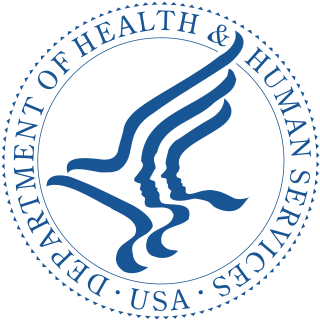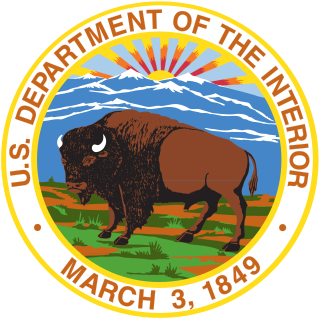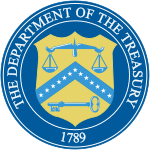
The United States Department of Labor (DOL) is one of the executive departments of the U.S. federal government. It is responsible for the administration of federal laws governing occupational safety and health, wage and hour standards, unemployment benefits, reemployment services, and occasionally, economic statistics. It is headed by the Secretary of Labor, who reports directly to the President of the United States and is a member of the president's Cabinet.

The United States Department of Justice (DOJ), also known as the Justice Department, is a federal executive department of the United States government tasked with the enforcement of federal law and administration of justice in the United States. It is equivalent to the justice or interior ministries of other countries. The department is headed by the U.S. attorney general, who reports directly to the president of the United States and is a member of the president's Cabinet. The current attorney general is Merrick Garland, who has served since March 2021.

The Department of the Treasury (USDT) is the national treasury and finance department of the federal government of the United States, where it serves as an executive department. The department oversees the Bureau of Engraving and Printing and the U.S. Mint. These two agencies are responsible for printing all paper currency and minting coins, while the treasury executes currency circulation in the domestic fiscal system. The USDT collects all federal taxes through the Internal Revenue Service; manages U.S. government debt instruments; licenses and supervises banks and thrift institutions; and advises the legislative and executive branches on matters of fiscal policy. The department is administered by the secretary of the treasury, who is a member of the Cabinet. The treasurer of the United States has limited statutory duties, but advises the Secretary on various matters such as coinage and currency production. Signatures of both officials appear on all Federal Reserve notes.

The United States Department of Health and Human Services (HHS) is a cabinet-level executive branch department of the U.S. federal government created to protect the health of the U.S. people and providing essential human services. Its motto is "Improving the health, safety, and well-being of America". Before the separate federal Department of Education was created in 1979, it was called the Department of Health, Education, and Welfare (HEW).

The United States Department of the Interior (DOI) is one of the executive departments of the U.S. federal government headquartered at the Main Interior Building, located at 1849 C Street NW in Washington, D.C. It is responsible for the management and conservation of most federal lands and natural resources, and the administration of programs relating to Native Americans, Alaska Natives, Native Hawaiians, territorial affairs, and insular areas of the United States, as well as programs related to historic preservation. About 75% of federal public land is managed by the department, with most of the remainder managed by the Department of Agriculture's Forest Service. The department was created on March 3, 1849.

The United States Department of Housing and Urban Development (HUD) is one of the executive departments of the U.S. federal government. It administers federal housing and urban development laws. It is headed by the Secretary of Housing and Urban Development, who reports directly to the President of the United States and is a member of the president's Cabinet.

The Office of Foreign Assets Control (OFAC) is a financial intelligence and enforcement agency of the U.S. Treasury Department. It administers and enforces economic and trade sanctions in support of U.S. national security and foreign policy objectives. Under Presidential national emergency powers, OFAC carries out its activities against foreign states as well as a variety of other organizations and individuals, like terrorist groups, deemed to be a threat to U.S. national security.
In the United States, Office of Inspector General (OIG) is a generic term for the oversight division of a federal or state agency aimed at preventing inefficient or unlawful operations within their parent agency. Such offices are attached to many federal executive departments, independent federal agencies, as well as state and local governments. Each office includes an inspector general and employees charged with identifying, auditing, and investigating fraud, waste, abuse, embezzlement and mismanagement of any kind within the executive department.
The Committee on Foreign Investment in the United States is an inter-agency committee of the United States government which reviews the national security implications of foreign investments in U.S. companies or operations, using classified information from the United States Intelligence Community.

The International Emergency Economic Powers Act (IEEPA), Title II of Pub. L.Tooltip Public Law 95–223, 91 Stat. 1626, enacted October 28, 1977, is a United States federal law authorizing the president to regulate international commerce after declaring a national emergency in response to any unusual and extraordinary threat to the United States which has its source in whole or substantial part outside the United States. The act was signed by President Jimmy Carter on December 28, 1977.

The Office of Intelligence and Analysis (OIA) is a component of the United States Department of the Treasury responsible for the receipt, analysis, collation, and dissemination of foreign intelligence and counterintelligence information related to the operation and responsibilities of the Treasury Department.
The Emergency Economic Stabilization Act created the Troubled Asset Relief Program to administer up to $700 billion. Several oversight mechanisms are established by the bill, including the Congressional Oversight Panel, the Special Inspector General for TARP (SIGTARP), the Financial Stability Oversight Board, and additional requirements for the Government Accountability Office (GAO) and the Congressional Budget Office (CBO).

The Internal Revenue Service (IRS) is the revenue service for the United States federal government, which is responsible for collecting U.S. federal taxes and administering the Internal Revenue Code, the main body of the federal statutory tax law. It is an agency of the Department of the Treasury and led by the Commissioner of Internal Revenue, who is appointed to a five-year term by the President of the United States. The duties of the IRS include providing tax assistance to taxpayers; pursuing and resolving instances of erroneous or fraudulent tax filings; and overseeing various benefits programs, including the Affordable Care Act.

The Recovery Accountability and Transparency Board was an agency of the United States federal government, which managed the Recovery.gov website and oversaw spending under the American Recovery and Reinvestment Act of 2009. Recovery.gov was the U.S. government’s official website that provided easy access to data related to Recovery Act spending and allowed for the reporting of potential fraud, waste, and abuse.

The Magnitsky Act, formally known as the Russia and Moldova Jackson–Vanik Repeal and Sergei Magnitsky Rule of Law Accountability Act of 2012, is a bipartisan bill passed by the U.S. Congress and signed into law by President Barack Obama in December 2012, intending to punish Russian officials responsible for the death of Russian tax lawyer Sergei Magnitsky in a Moscow prison in 2009 and also to grant permanent normal trade relations status to Russia.

The Venezuela Defense of Human Rights and Civil Society Act of 2014 is a United States law used to impose targeted sanctions on certain individuals in Venezuela that were responsible for violations of human rights of antigovernment protesters during the 2014 Venezuelan protests. The law is also used to strengthen civil society in Venezuela, and for other purposes.
The Pandemic Response Accountability Committee (PRAC) is an independent oversight committee within the Council of the Inspectors General on Integrity and Efficiency, created by the Coronavirus Aid, Relief, and Economic Security (CARES) Act of 2020 to ensure that the $2.2 trillion of the CARES act, plus 5 other pandemic-related pieces of legislation totaling over $5 trillion in government funds, were not misspent.
The U.S.Department of Housing and Urban Development Office of Inspector General is one of the Inspector General offices created by the Inspector General Act of 1978. The Inspector General for the Department of Housing and Urban Development is charged with investigating and auditing department programs to combat waste, fraud, and abuse.
The U.S.Department of the Interior Office of Inspector General is one of the Inspector General offices created by the Inspector General Act of 1978. The Inspector General for the Department of the Interior is charged with investigating and auditing department programs to combat waste, fraud, and abuse.
The U.S.Department of Veterans Affairs Office of Inspector General is one of the Inspector General offices created by the Inspector General Act of 1978. The Inspector General for the Department of Veterans Affairs is charged with investigating and auditing department programs to combat waste, fraud, and abuse.









